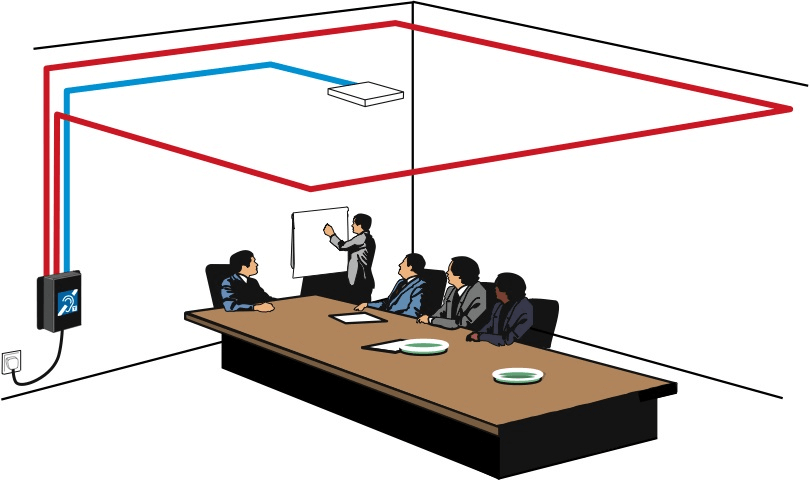BLOG
Home » Calculating Hearing Loop Demand and Return on Investment – Hearing Loop

Introduction to Calculating Hearing Loop Demand and Return On Investment
When appraising their induction hearing loops demand options when it comes to hearing loop systems, many businesses can find themselves asking if they really need one.
Most businesses, whether they’re aware of it or not, will have people with a hearing impairment come through their doors. The vast majority of the global geriatric population suffers from some form of disabled hearing loss. However, people with hearing loss of any age suffer from noise pollution, and poor experiences in various areas due to the overwhelming or unfiltered sound source. Believe it or not, there are approximately 9 million people with some form of hearing loss in the UK, all of whom will need retail, leisure, entertainment, health, business or public services at some point in their lifetime.
However, you can easily improve sound quality for those people in your business simply by using little technologically advanced products called induction loops. They are a cost-effective solution that can significantly enhance a person’s experience in any area!
If there isn’t a hearing loop sound system present at your place of business, the lack of a hearing loop sign makes this immediately apparent. This doesn’t just mean you aren’t serving customer demand but could be losing custom to rivals who offer a more inclusive experience.
Businesses are required by law to provide reasonable adjustments for those with a hearing impairment. So, installing a hearing loop is not just a case of best practice – it’s about abiding by legislation.

One-to-One Environments
In the case of smaller businesses, a portable hearing loop system doesn’t have to mean a big install and costly disruption – it can be an easy, quick affair.
For shops or retail outlets where one-to-one interactions are daily occurrences, a small portable hearing loop device is a low-cost, practical solution that is easily installed and can be used by visitors with hearing difficulties right away.
A customer with a hearing impairment will recognise this and is more likely to become a regular customer and spread the word about your forward-thinking approach.
The idea in business is always to provide what the customer needs and wants, and a small-scale portable hearing loop system does just that.
In the current difficult retail trading environment, a portable hearing loop also ensures return on investment for smaller businesses; in addition to being useful to customers, it’s mobile, agile, and portable, with no costly maintenance or expenditure after the initial purchase. This makes a portable system cost-effective with a marginal cost per use in the long term.
Multi-Room Setups
Many businesses, however, need to provide hearing loop coverage for more than one space. In cases where you might need a hearing loop system for three or more rooms, a portable option is still the best way to go. A fixed hearing loop system, as we’ve seen, isn’t flexible. Once it’s in place, that’s the area it will cover. Adding to this means installation, disruption, and expense. For businesses that are growing or moving premises, this can be a costly process – in more ways than one.
A portable hearing loop system will not throw up these same issues and afford your business the flexibility you need to thrive. A portable system is designed to serve the demands of multi-room spaces. If you have a portable hearing loop system in parts of your building but find you need immediate coverage in another space, you can simply move the components of the system and make it so. Right away, the additional room is covered by a quality, robust hearing loop system which can accommodate anyone who needs it.
Moreover, a portable hearing loop system can be split across spaces to provide extra coverage, which gives you the flexibility to use all the space you have and enable those with hearing impairments to do the same.
Complying with the laws and regulations
As mentioned above, providing quality hearing loop systems for those with a hearing loss disability is about more than just increasing their sound quality and perceived pleasure. It is also about following the government initiatives to make life easier for people with hearing loss. That means it’s about following the laws and regulations of the country.
Your business is required by law to provide the amenities necessary for those with hearing loss disorders. And, there is no denying that the best way to cater to their needs is by having modern hearing loop devices.
Millions of people across the UK rely on their hearing aids every day, but, in busy areas, and in any kind of business, a hearing aid may not be enough. As the owner of a business, it is your duty to ensure that everyone has access to the business, and can use your facilities safely and easily. And, that means making a clear hearing comprehension effort for those who suffer from disabled hearing loss.
Hearing loops are an easy, simple, and efficient way of ensuring that everyone who enters your premises, no matter their hearing disorders, can benefit from your business, and feel seen, heard, and respected.
What’s more, simply having induction loops can help to protect your business from fines and even costly legal disputes. Therefore, it makes perfect sense on the return.
Return on Investment
When conducting your portable hearing loop checklist, a key concern is the induction loop demand vs. cost-benefit analysis and return on investment. It’s important not to think of a hearing loop system as a sunk cost because it isn’t. Yes, it is a requirement, but that doesn’t mean a hearing loop system can’t benefit your business in a number of financial and non-financial ways. Any business satisfying the hearing loop device demand by offering an inclusive experience for all customers, regardless of hearing loss, is well placed to have a very real, positive impact.
Take, for example, a restaurant. This type of environment is usually challenging, confusing, and often unpleasant for those with a hearing impairment. The background noise can be problematic, with music, lots of loud chatter, and, more often than not, poor acoustics and no provision for those with hearing difficulties.
What this usually adds up to for the hearing-impaired customer is a very unpleasant experience and an unwillingness to return. If this restaurant were to make a concerted effort to install a portable induction hearing loop system at their bar and ordering points, and provide specific areas that are acoustically sound, their induction loop demand would be satisfied, and it would encourage the customer to return.
They are also more likely to leave a positive review and recommend the venue, in turn generating more repeat business and referrals.
In broader terms, the willingness to provide a quality portable hearing loop system marks your business out as a concern that is aware of its responsibilities to all customers.
Download our guide to portable hearing loop systems now or contact us and see how we could help your business.
Call 0114 2357 717 or email us at info@hearingloop.co.uk to get connected to one of our hearing loop experts.
Categories
- Assisted Living (3)
- Communication (4)
- Compliance (2)
- Cordless Telephones (3)
- Design Survey (1)
- Features & Benefits (1)
- Features & Benefits (1)
- General Hearing (5)
- Hearing Loop Systems (14)
- Hearing Loop Uses (4)
- Hearing Loops (30)
- Installation & Commissioning (3)
- Installation & Commissioning (1)
- Portable Hearing Loop (3)
- Portable Hearing Loops (15)
- Service & Maintenance (2)
- Service & Maintenance (1)
- Uncategorized (2)
Recent Posts
- Hearing Loops And Mental Health
- 10 Remarkable Benefits of Using the PL1/K1 Portable Hearing Loop System
- The Ultimate Guide to Phonak Roger ON: How It Works and Who It’s For
- The PL1/K1 Portable Hearing Loop: A Game-Changer for Midwives and Community Healthcare Providers
- Future Proofing Your Portable Hearing Loop System Investment

